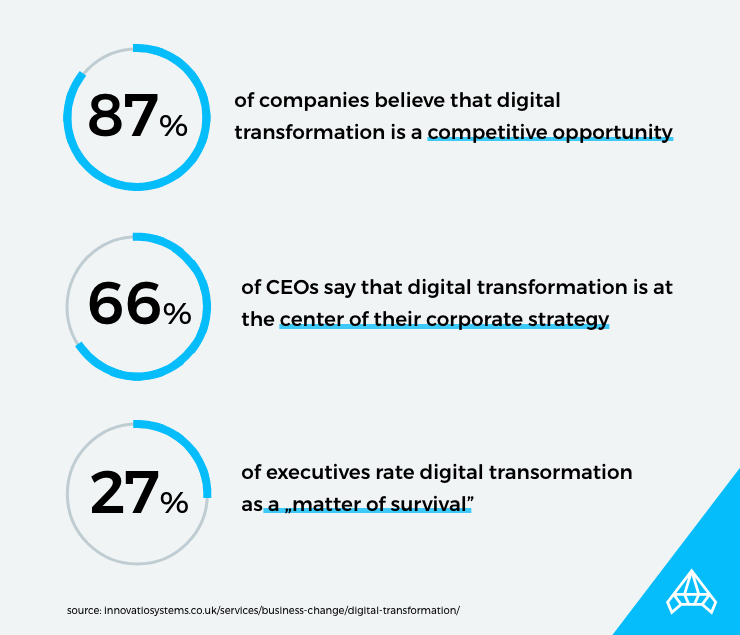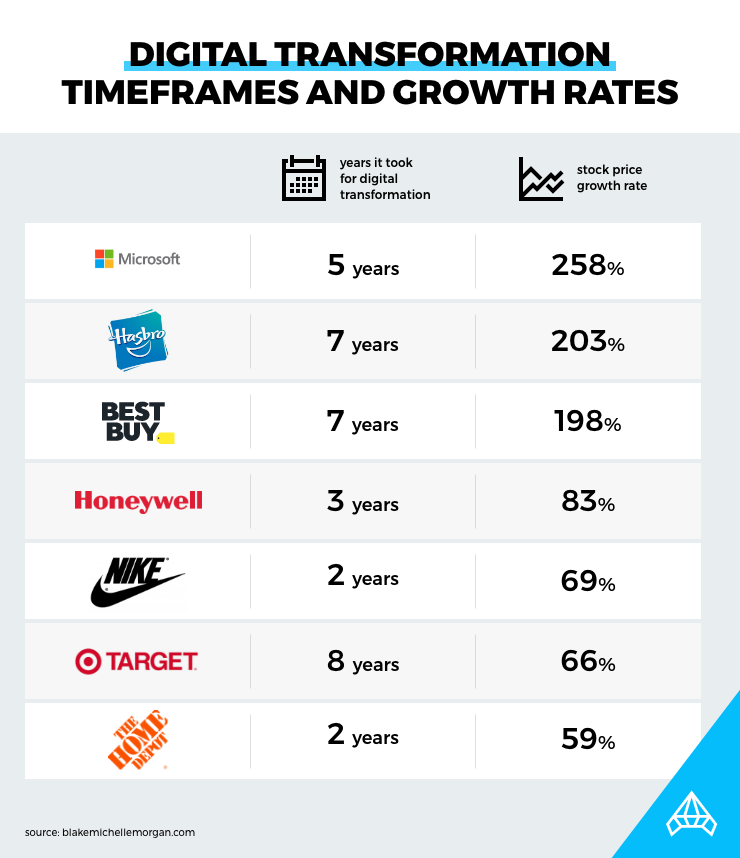Digital Transformation is a concept that has gained significant momentum in recent times. However, amid all the global white noise about companies investing considerable time, efforts, and capital into digital transformation, what does digitally transforming your business really mean?
Is it about keeping up with the latest technology? Or is there a deeper meaning that connects the transformation to how consumers want to interact with your brand? In this blog post, we explore what digitally transforming your business in 2020 is like, what to expect, and how, if done right, it can contribute to the growth of your business.
What is digital transformation?
Just like how biological evolution makes sure that a species survives the many changing conditions in the world, digital growth ensures that irrespective of the many technological changes happening across the globe, a business can still thrive and grow.
Simply put, digital transformation is the process of using up and coming digital technologies to either modify or create new business processes. While many businesses view the concept of digital transformation as a disruption, there’s no doubt that they add incredible value to the organization and bring multi-faceted benefits to any business.
Digital transformation transcends traditional roles like sales, marketing, or even customer service. It goes beyond businesses trying to meet the changing needs of the market and stay ahead of the competition. Digital transformation begins and ends with only one factor – customer engagement.

How does digitization impact customer engagement?
There’s no doubt that digital transformation is changing how businesses work. As organizations move from traditional paper and spreadsheets to smart applications to manage their operations, they have a chance to reinterpret how they do their business – how they engage with their customers, with digital technology on their side.
More and more companies are now taking a step back and revisiting everything they do – from internal systems that they use on a day-to-day basis to how they interact with their customers. Questions like, “How can I change my processes to add value to every customer interaction?” and “Can my processes enable a better and personalized customer experience” is on the mind of many CEOs in the world today.
For instance, let’s consider Netflix:
A classic example of digital transformation and customer engagement is Netflix. Netflix started as a simple mail-order service but ended up disrupting the entire brick-and-mortar video rental business. By taking advantage of digital innovation, Netflix made wide-scale video streaming possible. Today, Netflix has almost replaced the traditional broadcast and cable television networks by simply offering a growing library of on-demand content at extremely competitive prices.
Digitization not only allowed Netflix to stream video content directly to their customers on their laptop screens and mobile phones but also gain an unparalleled insight into the viewing habits and preferences of each user. The amount of massive data collected helped Netflix design a better user experience, and understand the shows and movies that the majority of their audience is interested in. Thus, by using digital transformation, Netflix made a net income of over 1.86 billion U.S. dollars in 2019! (Yes, you read that right!)
In fact, one of our clients, Hesus reached out to us because their existing systems were old, laborious, and obsolete. They wanted to digitally transform their business so they could streamline their processes and increase their overall efficiency.

How can digital transformation benefit your business?
1. Streamlines existing processes
If you’ve been running a successful business for a couple of years now, then you know that executing any operational process is extremely time-consuming. In a world where time is a luxury, you just cannot afford to spend precious time on redundant processes – operational or otherwise. By using digitization and cutting edge, new-age technology, business operations such as communication, data storage, and analytics can become more adaptable and collaborative, in turn, maximizing results.
2. Increases overall efficiency
Because all your processes are now streamlined, thanks to digitization, you no longer have to worry about unexpected bottlenecks. Digital processes allow the quick flow of inter-departmental information, eliminates redundant tasks, and improves the overall efficiency of the business.
This, in turn, also helps reduce the operational costs that are associated with complex, time-consuming workflows. The digital transformation of business prevents the bottleneck of data and information. Also, streamlined processes and increased efficiency means that the workflows can be adjusted quickly and easily, based on the changing priorities and goals of your business.
Discover more about the benefits of digital transformation for business